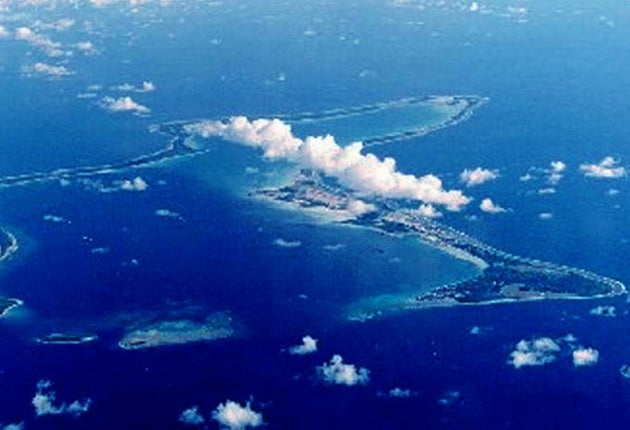Government accused of profiting from sales of Chagos Islands '.io' domain name

Your support helps us to tell the story
From reproductive rights to climate change to Big Tech, The Independent is on the ground when the story is developing. Whether it's investigating the financials of Elon Musk's pro-Trump PAC or producing our latest documentary, 'The A Word', which shines a light on the American women fighting for reproductive rights, we know how important it is to parse out the facts from the messaging.
At such a critical moment in US history, we need reporters on the ground. Your donation allows us to keep sending journalists to speak to both sides of the story.
The Independent is trusted by Americans across the entire political spectrum. And unlike many other quality news outlets, we choose not to lock Americans out of our reporting and analysis with paywalls. We believe quality journalism should be available to everyone, paid for by those who can afford it.
Your support makes all the difference.The UK Government is profiting from the clearance of the Chagos Islands in the Indian Ocean, by receiving a share of the profits from the sales of archipelago’s popular internet domain name.
Dozens of companies have snapped up the “.io” suffix originally intended for internet users in the British owned chain of islands. Its inhabitants were forcibly removed between 1967 and 1973 to make way for an American air strip on Diego Garcia, now one of Washington’s most important overseas bases.
Since the islands - formally known as the British Indian Ocean Territory (BIOT) - have no permanent residents beyond UK and American military personnel, the domain name is offered for sale on the open market under a little-noticed deal struck in 1998.
Under the terms of the agreement with Dorset based company Internet Computer Bureau (ICB), the Government receives an undisclosed share of the £60 fee to activate each .io name.
The number of domains sold has not been disclosed, along with the amount of money paid into Treasury coffers, but the name is proving particularly popular with internet and technology start-up companies.
The “.io” designation for “Indian Ocean” is the same as the IT abbreviation for “input/output”, describing the relationship between a computer and its user, and is being snapped by software firms.
Campaigners today called on the Government to ensure the income from the domain name sales is ring-fenced for use to maintain the islands and help facilitate a potential re-settlement of Chagossians.
The Foreign and Commonwealth Office earlier this year commissioned a feasibility study on the return of islanders, many of whom are impoverished and who have fought for decades for adequate compensation as well as the right to once more live in the archipelago.
Allen Vincatassin, president of the Diego Garcia and Chagos Islands Council, said: “We do not know what sort of income is being received from the sale of these internet domains and to what use it is being put. This another example of money being behind the backs of Chagossians.
“The Government should disclose how much money it has received and provides assurances that it will be used for the islands, including the resettlement that so many Chagossians want to see happen.”
The sale of domain names has proved lucrative for a number of small countries and territories fortuitously granted in-demand suffixes. The Pacific nation of Tuvalu receives about £1.3m a year - about a tenth of its GDP - from sales of its “.tv” domain while Montenegro has sold at least 320,000 “.me” names.
Paul Kane, the founder of the ICB and a respected expert on internet infrastructure, confirmed that a share of the fee paid to use the “.io” domain was received by the Government.
Speaking to the Gigaom website, which revealed the existence of the arrangement, he said: “Each of the overseas territories has an account and the funds are deposited there because obviously the territories have expenses that they incur and it’s offsetting that.”
The BIOT costs around £2m a year to administer, including the running of a chartered fishery protection vessel to patrol the recently-established vast marine reserve surrounding the islands. It receives income from a small recreational fishery run off Diego Garcia.
Author Philippa Gregory, who is also a campaigner for the Chagos Islanders, said: "None of the Chagossians in exile from their homeland for forty years had any idea that there was a profit being made from their homeland. None of the profits from this sale come back to the community who are mostly living in hardship or poverty in Mauritius, Seychelles and in the UK.
"It is hard not to see this as a further injustice to these people who were moved from their island homeland in the Indian Ocean and are still in enforced exile."
The FCO did not respond to a request for comment on the domain name sales.
Join our commenting forum
Join thought-provoking conversations, follow other Independent readers and see their replies
Comments